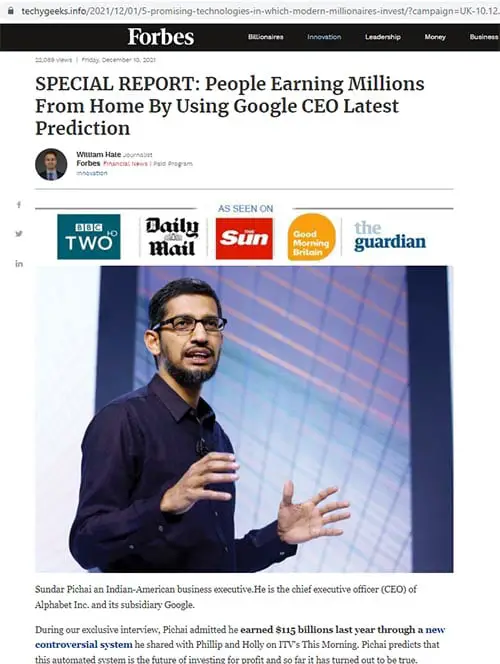Beware scam adverts using Twitter’s “Promoted Tweets” feature
When it comes to social media platforms forcing scam adverts down the throats of their own users, it’s usually Facebook that we’re pointing the finger at.
But other social media platforms are also guilty of the same thing. Today we bumped into a get-rich-quick scam on Twitter, and it was being shown to us via Twitter’s paid-for “Promoted Tweets” platform.
This is the promoted tweet we saw.

‘Promoted tweets’ is the Twitter equivalent to Facebook’s “Sponsored Ads”. It is where users can pay the social platform to get their advertisement in front of the platform’s users. It’s one of the main ways social media platforms drive revenue.
But since the social media platform is directly making money from these types of adverts by forcing them onto the screens of their users, there is an expectation that these adverts should at least be safe. But like Facebook, Twitter is also failing at this moral duty.
Sponsored Content. Continued below...
In the case of the promoted tweet above, which claims the CEO of Google shocked the world with a “bombshell announcement” about giving the “wealth back to the people”, this was – as we had suspected – going to direct us to a pretty bog-standard work-from-home get-rich-quick scheme. And that’s what it did.
As soon as we clicked the link, we were taken to a fake Forbes media article (demonstrably fake since it wasn’t hosted on the Forbes.com domain, as you can see from the screenshot below.)

That fake article in turn led to a scheme called QuantumAI, which is one of countless work-from-home schemes on the Internet that make vague claims about getting rich with “revolutionary” trading software.
But the grand claims are all fake, as well as the celebrity endorsements and media articles. In reality, these are all shady websites that try and direct victims to even shadier (and often unregulated) broker platforms where those who deposit the required money to begin the program will likely wind up losing all their money.
Sponsored Content. Continued below...
That is to say, not only won’t you get rich, you won’t make any money at all. In fact, you’ll almost certainly lose money.
Get-rich-quick scams are always popular on social media and often use social media’s paid advertising features to get exposure. It’s not just Facebook and Twitter. Scammers have also exploited Instagram, TikTok and a host of other social platforms in a similar way.
To avoid these scams, be especially wary of…
- Scams that claim to involve revolutionary or ground-breaking systems that involve trading or trading software but are ultimately vague about how you’d actually make money.
- Adverts that take you to media articles that aren’t hosted on the correct website.
- Adverts or webpages that claim well-known celebrities or business people are endorsing a system where you can make lots of money.
- Schemes that claim you can get rich easily and quickly. Remember – if it appears too good to be true, it probably is!
- Schemes that require you to make a down-payment to begin
Continued below...
Thanks for reading, we hope this article helped, but before you leave us for greener pastures, please help us out.
We're hoping to be totally ad-free by 2025 - after all, no one likes online adverts, and all they do is get in the way and slow everything down. But of course we still have fees and costs to pay, so please, please consider becoming a Facebook supporter! It costs only 0.99p (~$1.30) a month (you can stop at any time) and ensures we can still keep posting Cybersecurity themed content to help keep our communities safe and scam-free. You can subscribe here
Remember, we're active on social media - so follow us on Facebook, Bluesky, Instagram and X
